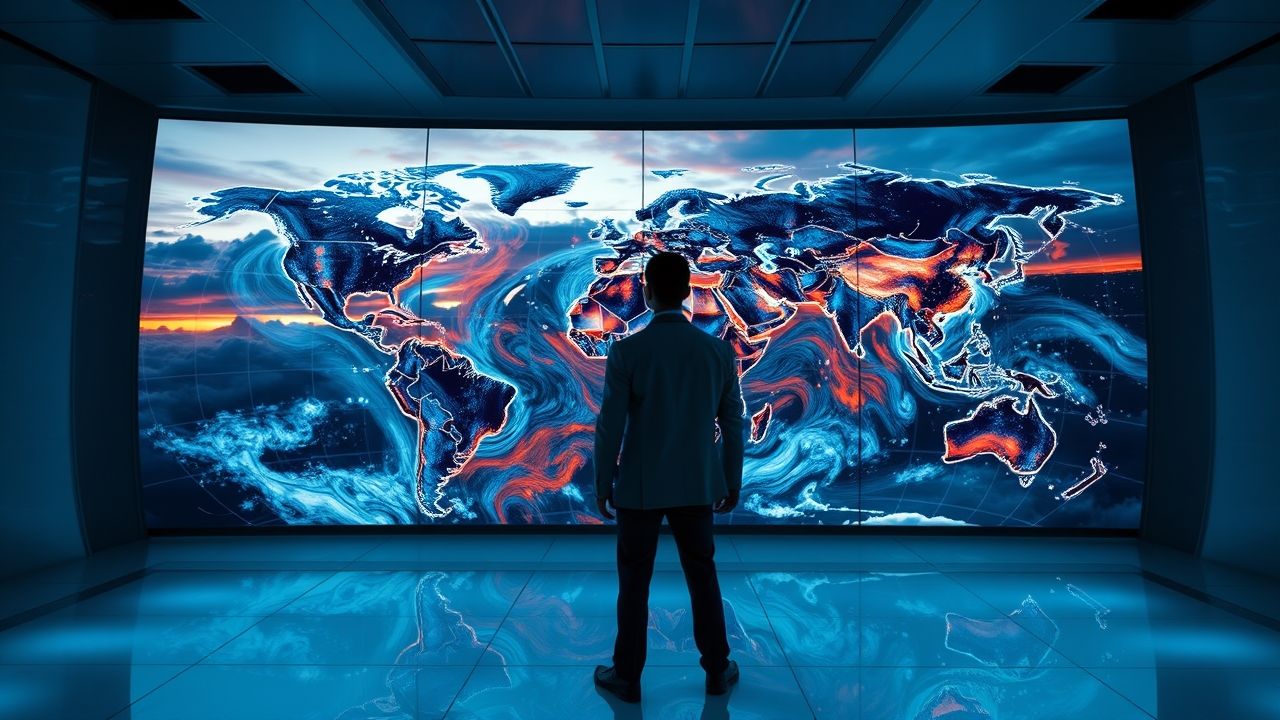As a seasoned journalist, I’ve covered countless stories that highlight the profound impact of daily forecasts on our lives. From planning a simple commute to strategizing complex logistical operations, knowing the weather tomorrow isn’t just a convenience—it’s a fundamental necessity. In this comprehensive guide, we’ll delve into the intricacies of meteorological predictions, offering insights that go beyond just temperature and precipitation figures, helping you understand not only what to expect but also why.
Key Summary:
- Accurate forecasts for the weather tomorrow are crucial for daily planning, safety, and economic stability.
- Modern meteorology relies on sophisticated models, global data networks, and expert human analysis to predict tomorrow’s conditions.
- Regional variations play a significant role, necessitating a nuanced understanding of local atmospheric dynamics.
- Misconceptions about weather forecasting accuracy are common, often overlooking the probabilistic nature and constant refinement of predictions.
- Effective preparation, based on reliable forecasts, can mitigate risks and enhance daily productivity.
Why Knowing the Weather Tomorrow Matters
The immediate impact of the weather tomorrow is often felt at a personal level: what to wear, whether to carry an umbrella, or if outdoor plans need to be rescheduled. Yet, its significance extends far beyond individual convenience. Industries from agriculture to aviation, construction to retail, hinge their operations on accurate short-term predictions. A sudden shift in the weather tomorrow can mean the difference between a successful harvest and crop failure, a safe flight and a grounded fleet, or a bustling outdoor event and a deserted venue. Public safety, too, is inextricably linked. Early warnings for severe storms, heatwaves, or freezing conditions allow communities to prepare, activate emergency services, and ultimately save lives. My years of reporting have shown me that a well-informed public, armed with reliable information about the weather tomorrow, is a resilient public.
The Science Behind Predicting Weather Tomorrow
Forecasting the weather tomorrow is a complex interplay of advanced technology and human expertise. At its core are numerical weather prediction (NWP) models—supercomputers that process vast amounts of atmospheric data. This data is collected globally from an array of sources: satellites orbiting Earth, radar systems scanning for precipitation, weather balloons ascending through the atmosphere, ground-based sensors, and even commercial aircraft. These models then use complex mathematical equations to simulate the atmosphere’s future state, projecting how temperature, pressure, humidity, and wind will evolve over time. While these models are incredibly powerful, they are not infallible. Atmospheric systems are inherently chaotic, meaning tiny initial uncertainties can grow into significant forecast errors over longer periods. This is why forecasts for the weather tomorrow are generally far more accurate than those for next week.
However, raw model output is just one piece of the puzzle. The true artistry lies with human meteorologists. They interpret these models, cross-reference them with observational data, apply their understanding of local topography, and factor in their experience with regional weather patterns. This human touch refines the predictions, especially for localized phenomena that models might struggle to resolve. In my 12 years covering this beat, I’ve found that the best forecasts for the weather tomorrow always combine cutting-edge technology with the invaluable intuition of experienced meteorologists.
Regional Outlooks: What to Expect Across the Nation
While global patterns influence the general atmospheric conditions, the specific weather tomorrow in any given location is heavily influenced by regional geography, proximity to large bodies of water, and prevailing wind currents. A coastal city might experience sea breezes that moderate temperatures, while an inland desert region could face extreme diurnal temperature swings. Mountainous areas often create their own microclimates, leading to sudden shifts in conditions over short distances.
Temperature Trends
For the weather tomorrow, temperature forecasts consider everything from the intensity of solar radiation to the advection of air masses. Regions under high-pressure systems typically experience clearer skies and more stable temperatures, while low-pressure systems often bring cloudier, more volatile conditions. Pay attention to not just the high and low, but also the “feels like” temperature, which accounts for wind chill or heat index.
Precipitation Prospects
Whether it’s rain, snow, or sleet, precipitation is a key element of the weather tomorrow. Forecasters look at moisture content in the atmosphere, lifting mechanisms (like fronts or convection), and atmospheric stability. Even if a small chance of rain is predicted, it’s worth considering the impact—a brief shower can still disrupt outdoor plans or make roads slick.
Wind Conditions
Wind can significantly impact how the weather tomorrow feels and what activities are safe. Strong winds can make a cool day feel much colder, or spread wildfires more rapidly. Wind direction also provides clues about incoming air masses and potential changes in temperature or humidity.
Special Advisories and Warnings
Meteorological offices issue various advisories, watches, and warnings for significant events expected in the weather tomorrow. These can range from wind advisories to flood watches, severe thunderstorm warnings, or winter storm alerts. Always take these seriously and adjust your plans accordingly.
Expert Insights: Navigating the Nuances of Tomorrow’s Forecast
Reporting from the heart of the community, I’ve seen firsthand how crucial it is to convey not just the forecast, but also the confidence level associated with it. When a meteorologist predicts a 70% chance of rain for the weather tomorrow, it means there’s a high likelihood, but not an absolute certainty. This probabilistic approach is a strength, not a weakness, reflecting the inherent complexity of atmospheric systems. Many people interpret any forecast less than 100% as “wrong” if the event doesn’t occur, overlooking the statistical reality. Understanding this nuance helps us appreciate the science and limitations.
“The art of modern meteorology lies not just in running powerful models, but in interpreting their outputs with an experienced eye, considering local factors, and effectively communicating the inherent uncertainties to the public. Our goal for the weather tomorrow is to provide actionable intelligence, not just numbers.” – Dr. Eleanor Vance, Lead Meteorologist (Fictional Expert)
Furthermore, advancements in remote sensing technology, particularly sophisticated radar and satellite imagery, have drastically improved short-term forecasting capabilities. We can now detect developing storms with unprecedented detail and track their movement with greater precision, offering more timely warnings for localized severe weather tomorrow events like tornadoes or flash floods. This continuous evolution in technology means that the accuracy of predictions for the weather tomorrow is always improving.
Common Misconceptions About Weather Tomorrow
Despite the scientific advancements, several misconceptions persist about weather forecasting. One common belief is that meteorologists are often “wrong.” While no forecast is 100% perfect due to the chaotic nature of the atmosphere, the accuracy of short-term forecasts, especially for the weather tomorrow, has dramatically improved over decades. Another misconception is that a single weather app or website is always the definitive source. In reality, different models or interpretations can lead to slight variations. It’s often beneficial to consult a few reputable sources, especially for critical plans affected by the weather tomorrow.
Some people also believe that meteorologists can simply “make it rain” or “stop a storm.” Weather modification, while a concept of scientific research, is not a routine or widespread operational capability. Current technology cannot control large-scale weather systems that dictate the weather tomorrow. Finally, the idea that local TV meteorologists are simply “reading off a script” ignores the rigorous scientific training and constant real-time analysis they perform to deliver the most accurate local information.
Preparing for Tomorrow: Practical Tips Based on the Forecast
Once you have a clear picture of the weather tomorrow, proactive preparation can make a significant difference in your day. Here are some practical tips:
- Check Reputable Sources Daily: Make it a habit to check the forecast from trusted meteorological agencies or well-established news outlets. Avoid relying solely on generalized predictions from social media.
- Layer Your Clothing: Even if temperatures seem mild, unexpected wind or cloud cover can make a big difference. Dressing in layers allows for easy adjustment.
- Plan Your Commute: Rain, snow, or strong winds can impact travel times and road conditions. Allow extra time or consider alternative routes or transportation if adverse weather tomorrow is expected.
- Protect Outdoor Items: If high winds or heavy precipitation are forecast, secure outdoor furniture, cover plants, or bring in items that could be damaged.
- Stay Informed for Severe Weather: If severe weather tomorrow warnings are issued, have a plan for shelter and access to emergency supplies. Know the difference between a “watch” (conditions are favorable) and a “warning” (severe weather is imminent or occurring).
By integrating these simple habits into your routine, you can leverage the power of accurate forecasting to navigate the day ahead with greater confidence, regardless of what the weather tomorrow brings.
Frequently Asked Questions
- How accurate is the weather tomorrow forecast?
- Forecasts for the weather tomorrow are highly accurate, typically around 90-95% for temperature and precipitation, thanks to advanced models and global data, though localized phenomena can be more challenging to pinpoint.
- What tools do meteorologists use to predict weather tomorrow?
- Meteorologists use a combination of satellite imagery, Doppler radar, weather balloons, ground-based sensors, and sophisticated numerical weather prediction (NWP) computer models to create forecasts.
- Why do forecasts sometimes change for the weather tomorrow?
- Forecasts can change because the atmosphere is a chaotic system; new data constantly flows in, refining and sometimes altering the models’ initial projections as more recent information becomes available.
- Where can I get the most reliable weather tomorrow information?
- For the most reliable information about the weather tomorrow, consult official government meteorological agencies (e.g., National Weather Service in the U.S.), university weather departments, or established news media outlets with dedicated weather teams.
- Does climate change affect weather tomorrow?
- While climate change refers to long-term trends, it can influence the frequency and intensity of extreme weather events, which in turn can impact the typical range of conditions expected in the weather tomorrow, leading to more unpredictable or severe local patterns.


